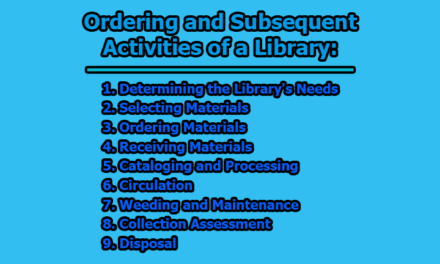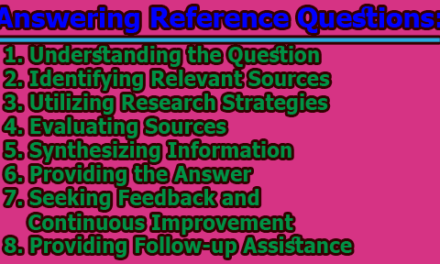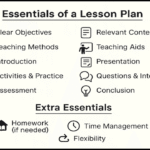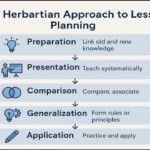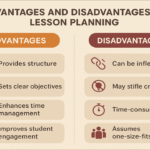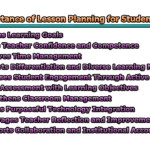A Comprehensive Guide on Transitioning from Library School to i-School:
The field of information science and technology has undergone significant transformations in recent years, prompting a shift in the educational landscape and the emergence of i-Schools. As library professionals navigate the digital era, many find themselves contemplating a transition from library school to i-School, seeking to enhance their skills and adapt to the evolving needs of the information landscape. This comprehensive guide aims to provide a detailed overview of the process, challenges, and opportunities involved in this transition. It delves into the distinctions between library school and i-School, explores the skills and competencies required in an i-School environment, offers guidance on professional development, and highlights the diverse career paths and job prospects available. Whether you are a recent library school graduate or a seasoned information professional, this guide will serve as a valuable resource to navigate the journey from library school to i-School and thrive in the ever-expanding field of information science and technology. A Comprehensive Guide on Transitioning from Library School to i-School.
1. Understanding Library School and i-School:
1.1 Library School Overview
1.1.1 Historical Context
Library schools, also known as library and information science (LIS) programs, have a rich history dating back to the late 19th century. These schools initially emerged to meet the growing demand for trained professionals in library management, cataloging, and reference services. Library schools played a vital role in developing standardized methods for organizing and accessing information, such as the Dewey Decimal Classification system and the development of library science as an academic discipline.
1.1.2 Curriculum and Skill Development
Library school curricula traditionally focused on core areas such as information organization and classification, reference services, collection development and management, and library administration. Students were trained in the principles and techniques of librarianship, including cataloging and metadata standards, information retrieval, and library ethics. The emphasis was on developing strong research and information literacy skills to support the needs of library patrons.
1.1.3 Traditional Library Roles and Responsibilities
Library school graduates typically pursued careers in libraries, working as librarians or information professionals in various settings such as public, academic, or special libraries. Their roles encompassed tasks such as assisting users in locating information, managing collections, providing reference services, and promoting information literacy. While libraries have always been at the forefront of information dissemination, the advent of the digital age has prompted a reevaluation of traditional library roles and the need for additional skills to navigate the evolving information landscape.
1.2 i-School Overview
1.2.1 Emergence and Evolution
The emergence of i-Schools, or information schools, reflects the changing nature of the information profession in the digital age. These schools evolved to address the broader scope of information science, acknowledging the increasing importance of technology, data management, and information systems. i-Schools originated in the 1990s as a response to the growing demand for professionals who could navigate and harness the power of emerging technologies.
1.2.2 Interdisciplinary Nature
One of the defining characteristics of i-Schools is their interdisciplinary approach. i-Schools bring together various disciplines, such as computer science, library science, psychology, design, and social sciences, to study and understand the complex interactions between people, information, and technology. This interdisciplinary focus enables students to develop a broader perspective on information issues, integrating multiple fields of study to solve complex problems and meet the needs of diverse user populations.
1.2.3 Focus on Information Technology
i-Schools place a strong emphasis on information technology and its role in shaping the way we access, use, and disseminate information. Students in i-Schools acquire technical skills in areas such as data analysis, information retrieval, database management, user experience design, and information architecture. The curriculum combines theoretical knowledge with hands-on training to equip graduates with the ability to leverage technology effectively in managing and analyzing information.
1.2.4 Expanding Career Opportunities
With the increasing reliance on technology and the exponential growth of digital information, i-Schools offer a wide range of career opportunities beyond traditional library roles. Graduates from i-Schools are well-equipped to pursue careers as data scientists and analysts, user experience (UX) and user interface (UI) designers, information architects, digital content strategists, and information consultants. These roles extend beyond library settings, encompassing industries such as technology companies, research institutions, government agencies, and consulting firms. The expanding career opportunities reflect the evolving nature of the information profession and the increasing demand for professionals who can leverage technology and data to drive innovation and decision-making.
2. Challenges and Opportunities:
2.1 Challenges Faced by Library School Graduates
Library school graduates who are considering a transition to i-School may encounter various challenges as they navigate the evolving information landscape. Understanding these challenges is essential for successful career planning and professional development.
2.1.1 Technological Shifts and Digital Transformation
One of the primary challenges for library school graduates is the rapid pace of technological advancements and the resulting digital transformation. The digital age has revolutionized how information is created, accessed, and shared. Library professionals are now required to possess digital literacy skills, be familiar with emerging technologies, and adapt to new tools and platforms. The challenge lies in keeping up with the ever-evolving technological landscape and acquiring the necessary skills to effectively leverage technology in information management.
2.1.2 Changing User Expectations
With the advent of the internet and digital resources, user expectations have significantly changed. Users now expect instant access to information, personalized services, and seamless user experiences. Library professionals need to understand and anticipate these changing user needs and preferences. They must be adept at leveraging technology to provide enhanced user experiences, develop user-centered services, and create user-friendly interfaces. Adapting to these shifting expectations requires ongoing professional development and a proactive approach to staying updated on user trends and preferences.
2.1.3 Shift in Information Management Paradigm
The information management paradigm has undergone a fundamental shift. Traditional library practices focused on physical collections, such as books and journals. However, in the digital age, information exists in various formats and platforms, including electronic resources, databases, and online repositories. Library school graduates must adapt to this new paradigm by developing skills in managing and organizing digital resources, understanding copyright and intellectual property issues in the digital realm, and implementing effective strategies for information discovery and access.
2.2 Opportunities in the i-School Landscape
While library school graduates face challenges, there are also numerous opportunities in the i-School landscape. These opportunities arise from the increasing demand for professionals who possess digital skills, can collaborate across disciplines, and explore emerging technologies.
2.2.1 Growing Demand for Digital Skills
As the digital landscape continues to expand, there is an increasing demand for professionals with digital skills in areas such as data analysis, information retrieval, database management, and user experience design. i-Schools provide an environment that focuses on developing these skills, equipping graduates with the technical expertise required to thrive in the digital age. By acquiring these digital skills, library school graduates can position themselves for a broader range of career opportunities beyond traditional library roles.
2.2.2 Collaboration and Interdisciplinary Work
i-Schools foster a culture of collaboration and interdisciplinary work, which is essential in addressing complex information challenges. Graduates from i-Schools are encouraged to work collaboratively with professionals from diverse backgrounds, such as computer science, psychology, and design. This interdisciplinary approach enables the exploration of different perspectives and the development of innovative solutions. Library school graduates transitioning to i-School can leverage this collaborative environment to expand their knowledge, build networks, and contribute to multidisciplinary projects.
2.2.3 Exploration of Emerging Technologies
i-Schools offer an ideal platform for exploring emerging technologies that are shaping the future of information management. Graduates have the opportunity to delve into areas such as artificial intelligence, machine learning, blockchain, virtual reality, and augmented reality. By embracing these technologies, library school graduates can stay at the forefront of innovation and contribute to the development of cutting-edge solutions for information challenges. The exploration of emerging technologies opens up new career paths and enhances the overall adaptability of library professionals in an increasingly technology-driven field.
3. Skills and Competencies:
3.1 Core Skills for Library School Graduates
Library school graduates possess a set of core skills acquired through their education and training. These skills form a strong foundation for their transition to i-School and include:
3.1.1 Information Organization and Classification
Library school graduates are adept at organizing and classifying information. They have a deep understanding of cataloging principles, metadata standards, and classification systems such as the Dewey Decimal Classification or Library of Congress Classification. This skill is essential for ensuring the efficient organization and retrieval of information in both physical and digital environments.
3.1.2 Reference and Research Services
Library school graduates are skilled in providing reference and research services to users. They possess the ability to locate, evaluate, and analyze information sources to meet user needs. They are familiar with various reference tools and techniques, such as bibliographic databases, reference interviews, and information literacy instruction. These skills enable them to assist users in finding relevant and reliable information.
3.1.3 Collection Development and Management
Library school graduates have expertise in collection development and management. They understand the principles of collection assessment, selection, and deselection. They are knowledgeable about the different types of resources, including books, journals, databases, and multimedia materials. Library school graduates can effectively manage collections by considering factors such as user needs, budget constraints, and resource evaluation.
3.2 Additional Skills for i-School Success
In addition to the core skills acquired in library school, transitioning to i-School requires the development of additional skills to succeed in the digital information landscape. These skills include:
3.2.1 Data Analysis and Visualization
i-Schools emphasize the importance of data analysis and visualization skills. Library school graduates can learn to work with large datasets, apply statistical methods, and interpret data to derive meaningful insights. They can also acquire skills in data visualization, using tools and techniques to present data in a visually appealing and understandable manner.
3.2.2 Information Retrieval and Search Technologies
i-Schools focus on information retrieval and search technologies in the context of digital information environments. Library school graduates can develop expertise in designing effective search strategies, understanding search algorithms, and evaluating search results. They can explore advanced techniques such as natural language processing, machine learning, and recommender systems to enhance information discovery and retrieval.
3.2.3 User Experience Design
User experience (UX) design is a critical skill for i-School graduates. Library school graduates can learn to design intuitive and user-friendly interfaces, considering factors such as usability, accessibility, and user-centered design principles. They can gain knowledge of UX research methodologies, prototyping tools, and usability testing to create seamless user experiences in digital information systems.
3.2.4 Programming and Database Management
i-Schools provide opportunities for library school graduates to acquire programming and database management skills. They can learn programming languages such as Python, JavaScript, or SQL, enabling them to develop web applications, automate tasks, and manipulate data. Additionally, they can gain proficiency in database management systems, learn how to design and query databases and ensure data integrity and security.
4. Bridging the Gap: Professional Development
To successfully transition from library school to i-School and excel in the evolving information landscape, it is crucial to engage in continuous professional development. This section explores various avenues for professional growth, including pursuing additional education, participating in continuing education and online courses, and establishing networking and mentorship connections.
4.1 Pursuing Additional Education
4.1.1 Graduate Programs in Information Science
Graduate programs in information science offered by i-Schools provide an excellent opportunity for library school graduates to gain specialized knowledge and skills. These programs offer comprehensive curricula that cover a wide range of topics, including information technology, data management, human-computer interaction, and digital libraries. Graduates can pursue master’s or doctoral degrees in information science or related fields to deepen their understanding of the interdisciplinary aspects of the information profession.
4.1.2 Specializations and Concentrations
Within information science programs, there are often opportunities to specialize or concentrate in specific areas of interest. Specializations can include data science, user experience design, digital curation, information architecture, or information policy. By selecting a specialization aligned with their career goals, library school graduates can acquire in-depth knowledge and expertise in a particular domain, further enhancing their professional profile.
4.2 Continuing Education and Online Courses
4.2.1 MOOCs and Online Learning Platforms
Continuing education plays a vital role in professional development. Massive Open Online Courses (MOOCs) and online learning platforms offer flexible and accessible opportunities to acquire new skills and knowledge. Platforms such as Coursera, edX, and Udemy provide a wide range of courses related to information science, data analysis, programming, UX design, and more. Library school graduates can choose courses that align with their professional goals and schedule, allowing them to continually update their skills and stay current with emerging trends and technologies.
4.2.2 Certifications and Professional Associations
Certifications are another valuable option for professional development. Various organizations offer certifications that validate specific skills and competencies. For example, the Project Management Professional (PMP) certification can be beneficial for those interested in project management roles. Professional associations such as the American Library Association (ALA) and the Association for Information Science and Technology (ASIS&T) offer specialized certifications and continuing education opportunities that cater to the needs of information professionals. Participating in these programs and associations can enhance professional credibility and provide access to a network of like-minded professionals.
4.3 Networking and Mentorship
4.3.1 Connecting with i-School Graduates
Networking is a crucial aspect of professional development, and connecting with graduates from i-Schools can provide valuable insights and opportunities. Attending industry conferences, workshops, and meetups focused on information science and technology allows library school graduates to interact with professionals already working in the field. Social media platforms like LinkedIn and professional online communities provide additional avenues for networking and knowledge-sharing. Engaging in conversations and actively participating in relevant discussions can lead to collaborations, job opportunities, and mentorship possibilities.
4.3.2 Mentoring Programs and Resources
Mentorship is a powerful tool for career development. Library school graduates transitioning to i-School can benefit from mentorship programs and resources offered by i-Schools, professional associations, and industry organizations. These programs pair experienced professionals with mentees to provide guidance, support, and career advice. Mentors can offer insights into industry trends, share their own experiences, and provide valuable feedback on professional growth. Additionally, online resources such as webinars, blogs, and podcasts focused on information science can serve as virtual mentors, offering guidance and inspiration.
5. Career Paths and Job Prospects:
5.1 Traditional Library Roles in the Digital Age
Library school graduates transitioning to i-School have the advantage of applying their skills and knowledge to traditional library roles while incorporating digital technologies and practices. Some of the traditional library roles in the digital age include:
5.1.1 Digital Librarianship and Archiving
As libraries embrace digital collections and resources, the role of digital librarianship becomes increasingly important. Digital librarians are responsible for managing digital collections, ensuring proper metadata and organization, and providing access to digital resources. They work with digital preservation techniques, develop strategies for long-term digital archiving, and collaborate with stakeholders to ensure the availability and integrity of digital materials.
5.1.2 Information Governance and Compliance
Information governance and compliance are critical aspects of library services, especially in the digital age. Library school graduates can contribute to ensuring compliance with privacy regulations, copyright laws, and ethical information practices. They can work in areas such as intellectual property management, data protection, and information policy development. By integrating legal and ethical considerations into information management practices, library professionals can protect the rights and privacy of users while facilitating responsible information use.
5.2 Emerging i-School Careers
The transition to i-School opens up a range of emerging career opportunities beyond traditional library roles. Library school graduates can leverage their core skills and additional competencies gained in i-School to pursue diverse information-related careers. Here are a few examples:
5.2.1 Data Scientist and Analyst
With their expertise in information organization, research, and data management, library school graduates can excel in data-driven roles. They can become data scientists and analysts, applying their analytical skills to extract insights from complex datasets, develop data models, and support evidence-based decision-making. They can work in various sectors, including academia, research institutions, government agencies, and private organizations, contributing to data-driven strategies and solutions.
5.2.2 UX/UI Designer
Library school graduates with a focus on user experience (UX) and user interface (UI) design can pursue careers as UX/UI designers. They can apply their knowledge of user-centered design principles to create intuitive and engaging digital interfaces. UX/UI designers collaborate with multidisciplinary teams to design user-friendly websites, applications, and interactive platforms. They conduct user research, create wireframes and prototypes, and iterate designs based on user feedback, ensuring optimal user experiences.
5.2.3 Information Architect
Information architects play a crucial role in designing and organizing digital information systems. Library school graduates can excel in this field by leveraging their expertise in information organization, classification, and retrieval. Information architects design the structure and navigation of websites, intranets, and other digital platforms, ensuring seamless access to information. They collaborate with stakeholders to define information requirements, develop taxonomies and metadata schemas, and create intuitive information architectures.
5.2.4 Digital Content Strategist
Library school graduates can become digital content strategists, focusing on the planning, creation, and management of digital content. They possess the skills to identify user needs, develop content strategies, and ensure effective content delivery across various platforms. Digital content strategists collaborate with content creators, UX designers, and marketing teams to create engaging and relevant content, optimize content for search engine visibility, and measure content performance.
6. Case Studies and Success Stories:
6.1 From Library School to i-School: Personal Journeys
Personal journeys of individuals who have transitioned from library school to i-School can provide valuable insights and inspiration for those embarking on a similar path. These case studies highlight the experiences, challenges, and achievements of individuals who successfully navigated the transition and established themselves in i-School careers. Through their stories, library school graduates can gain a better understanding of the possibilities and strategies for their own professional growth.
6.2 Interviews with Professionals in the Field
Interviews with professionals working in i-School-related roles provide an opportunity to learn from their experiences, gain industry insights, and understand the challenges and opportunities present in the field. These interviews can cover a range of topics, including their career paths, the skills and competencies they developed, the challenges they faced during their transition, and their advice for library school graduates considering a move to i-School. The interviews offer firsthand perspectives and practical advice from individuals who have already established themselves in the field.
6.2.1 Challenges Faced and Lessons Learned
Through interviews, professionals in the field can share the challenges they encountered during their transition from library school to i-School. These challenges may include adapting to new technologies, acquiring additional skills, adjusting to different work environments, and understanding the interdisciplinary nature of i-School. They can also discuss the lessons they learned from overcoming these challenges, such as the importance of continuous learning, networking, and embracing change. Understanding the challenges and lessons learned by others can provide valuable insights and guidance for library school graduates making their own transition.
6.2.2 Advice for Library School Graduates
In interviews, professionals in i-School roles can offer advice and guidance to library school graduates who are considering transitioning to the field. They can share their perspectives on the skills and competencies that are in high demand, the importance of interdisciplinary thinking, and the need to stay adaptable in a rapidly evolving information landscape. They may also provide insights into networking strategies, professional development opportunities, and industry trends. This advice from professionals who have successfully made the transition can help library school graduates navigate their own career paths with confidence and purpose.
7. Conclusion:
7.1 Recap of Key Takeaways
In this comprehensive guide on transitioning from library school to i-School, we have explored the differences between library school and i-School, the challenges and opportunities faced by library school graduates, the skills and competencies needed for success in the i-School landscape, professional development strategies, emerging career paths, and case studies and success stories from professionals who have made the transition. Here is a recap of the key takeaways:
- Library school provides a strong foundation in information organization, research, and traditional library roles, while i-School expands on these skills and incorporates a focus on information technology, data management, user experience, and emerging technologies.
- Library school graduates face challenges such as technological shifts, changing user expectations, and the shift in information management paradigms. However, these challenges also present opportunities for growth and adaptation.
- The i-School landscape offers expanding career opportunities, including roles in digital librarianship, information governance, data science and analysis, UX/UI design, information architecture, and digital content strategy.
- Core skills for library school graduates include information organization and classification, reference and research services, and collection development and management. Additional skills for success in i-School include data analysis and visualization, information retrieval and search technologies, user experience design, and programming and database management.
- Professional development strategies such as pursuing additional education, participating in continuing education and online courses, and establishing networking and mentorship connections are crucial for bridging the gap between library school and i-School.
7.2 Encouraging the Transition
Encouraging library school graduates to transition to i-School is essential for their professional growth and the advancement of the information profession as a whole. By embracing the interdisciplinary nature of i-School and acquiring additional skills, library school graduates can enhance their career prospects, adapt to changing industry demands, and contribute to the evolving information landscape. It is crucial for academic institutions, professional associations, and industry stakeholders to provide resources, support, and opportunities to facilitate this transition and encourage collaboration between library and i-School communities.
7.3 Future Trends and Directions
Looking ahead, several trends and directions are shaping the future of the information profession and the role of i-School graduates. These include:
- Continued technological advancements: Rapid advancements in technology, such as artificial intelligence, machine learning, and blockchain, will continue to influence the information profession. i-School graduates must stay updated with emerging technologies and develop the necessary skills to harness their potential.
- Ethical considerations: As the information landscape becomes increasingly complex, ethical considerations related to data privacy, algorithmic bias, and information access will gain prominence. i-School graduates will play a critical role in navigating these ethical challenges and ensuring responsible information management.
- Interdisciplinary collaboration: The interdisciplinary nature of i-School provides opportunities for collaboration with professionals from diverse fields such as computer science, design, social sciences, and business. i-School graduates should actively seek out collaboration opportunities to address complex information challenges and drive innovation.
- Lifelong learning: Continuous learning and professional development will remain essential for i-School graduates to stay abreast of industry trends, acquire new skills, and adapt to evolving roles and responsibilities. Embracing a mindset of lifelong learning will be crucial for success in the information profession.
FAQs:
What is the main difference between library school and i-School?
The main difference lies in the focus and curriculum. Library school primarily focuses on traditional library roles, such as information organization, reference services, and collection management. i-School, on the other hand, has a broader scope with an emphasis on information technology, data management, user experience design, and emerging technologies. i-School prepares graduates for a range of information-related careers beyond traditional libraries.
What are the challenges faced by library school graduates transitioning to i-School?
Library school graduates transitioning to i-School often face challenges related to technological shifts, changing user expectations, and adapting to the interdisciplinary nature of i-School. They may need to acquire additional skills and knowledge in areas such as data analysis, programming, and user experience design. Adjusting to new work environments and understanding the evolving information management paradigms can also pose challenges.
What are the career prospects for library school graduates in the i-School landscape?
The i-School landscape offers a wide range of career prospects for library school graduates. Traditional library roles in the digital age, such as digital librarianship and information governance, provide opportunities to incorporate digital technologies and practices. Additionally, emerging i-School careers, including data scientists and analysts, UX/UI designers, information architects, and digital content strategists, open up diverse paths for library school graduates to explore.
What additional skills are important for success in i-School?
In addition to core library skills, library school graduates transitioning to i-School can benefit from developing skills in areas such as data analysis and visualization, information retrieval and search technologies, user experience design, and programming and database management. These skills are in high demand in the i-School landscape and enable graduates to excel in emerging information-related roles.
How can library school graduates bridge the gap between library school and i-School?
Bridging the gap can be achieved through various professional development strategies. Pursuing additional education, such as graduate programs in information science, allows library school graduates to acquire specialized knowledge and skills. Continuing education through online courses and platforms like MOOCs can help them stay updated with industry trends. Networking and mentorship connections, particularly with i-School graduates, provide valuable guidance and support during the transition process.
What are the future trends and directions in the i-School landscape?
Future trends in the i-School landscape include continued technological advancements, increased focus on ethical considerations, interdisciplinary collaboration, and the importance of lifelong learning. i-School graduates should stay informed about emerging technologies, navigate ethical challenges, seek collaboration opportunities, and embrace a mindset of continuous learning to adapt to evolving roles and responsibilities in the information profession.
References:
- American Library Association (ALA). (2021). Library and information science.
- Dority, G. (2012). The accidental information professional: How librarians become information professionals. Information Today, Inc.
- com. (2023). Library Science and Information Science Graduate Programs.
- Lankes, R. D. (2007). Libraries, librarians, and the human information experience. Information Science Publishing.
- Leeder, C. (2016). Digital librarianship and the decline of library science education. Library Leadership & Management, 30(4).
- Library and Information Science Wiki. (2022). Information science.
- Pomerantz, J., & Luo, L. (2010). Searching for answers: Student research behaviors in a digital age. Library & Information Science Research, 32(2), 99-109.
- Rayward, W. B. (2008). Information science: origins and perspectives. In Encyclopedia of Library and Information Sciences (3rd ed., pp. 2382-2397). CRC Press.
- Rosenfeld, L., & Morville, P. (2006). Information architecture for the World Wide Web: Designing large-scale web sites. O’Reilly Media.
- Singh, M., & Thakur, S. (2020). Changing roles and competencies of librarians in the digital era: A systematic review. The Electronic Library, 38(4), 642-668.

Assistant Teacher at Zinzira Pir Mohammad Pilot School and College


